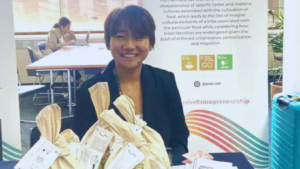Dimum Pertin, an inspiring young entrepreneur from Arunachal Pradesh, is not only preserving her tribal heritage but also addressing modern challenges like sustainable farming and climate change. Through her initiative, Gepo Aali, Dimum is reviving indigenous crops, especially the almost-forgotten Adlay Millet, while empowering local women and youth to play an active role in their community’s future.

A Journey from Engineering to Farming
Born in the Lower Dibang Valley, she spent much of her childhood away from home in boarding schools. After completing school, she moved to pursue her engineering degree. However, her real passion lay elsewhere, and she soon realized that her heart was set on something more meaningful to her roots and community. This led her to study Development Studies at the Tata Institute of Social Sciences (TISS), Mumbai. This new path allowed her to explore societal issues at a deeper level, setting the stage for her later work in sustainable agriculture.
After her studies, Dimum gained experience working as a digital marketing manager for a startup in Mumbai. Following that, she worked as a political consultant with the Indian Political Action Committee. But something was pulling her back to her home in Arunachal Pradesh. The stories and traditions from her grandmother—especially the traditional foods she loved—kept playing on her mind. One particular moment stands out: her grandmother’s cravings for Adlay Millet, a once-common crop that had nearly disappeared due to the spread of modern farming.
Founding Gepo Aali: A Mission to Revive Adlay Millet
In 2022, Dimum took the bold step of founding Gepo Aali, a startup dedicated to restoring the cultivation of Adlay Millet and other indigenous crops. Adlay Millet, once central to the diet of the Adi tribe, had fallen into obscurity as modern farming practices took over. But Dimum saw potential in this crop—not just as a food source but as a way to revive her tribe’s cultural heritage.

She realized that this wasn’t just about growing a crop. It was about educating the community—especially the younger generation—about the value of indigenous food crops. “When I started working on reviving Adlay Millet, I realized that younger people had no idea about such crops, let alone consume them,” Dimum explains that It’s crucial to bring them along on this journey to carry on the tradition.
Green Dreams: Champion of Farm
To engage the younger generation, Dimum launched an initiative under Gepo Aali called Green Dreams: Champion of Farm. This voluntary-led program invites young people to join her on the farm, where they learn about indigenous crops and sustainable farming practices. “It’s important for the young people to be aware of these food crops so that they can learn and maybe even want to add them to their diets,” she says.
The program goes beyond just farming. It addresses larger issues like land management and monoculture, which have long plagued the Northeast region. In Dambuk, for example, where orange orchards have seen a rapid decline in production, Dimum is experimenting with an agroforestry setup. The idea is to introduce indigenous food crops into the orchard, creating a more sustainable farming model. This system not only preserves biodiversity but also offers a climate-friendly way to farm.
Challenges in Value Addition
One of the biggest hurdles Dimum faces in her work is the lack of value addition for crops like Adlay Millet. “There are a lot of indigenous crops we consume, but the problem is we don’t add value to them,” she points out. To tackle this, she has been experimenting with ways to add value to Adlay Millet. ” I hope something concrete will come out of this experimentation by the end of this year,” she says optimistically.
By creating products from Adlay Millet, Dimum hopes to generate more interest in the crop, not only among consumers but also among local farmers. She recognizes that without a clear market or purpose, many farmers are reluctant to grow these traditional crops. But with value-added products, she believes Adlay Millet could once again become a staple, benefiting both the farmers and the wider community.
Recognition and Impact
In a short time, Gepo Aali has gained significant recognition. In 2023, the startup was selected to represent India at the prestigious Youth Collab Summit in Bangkok, where it won in the Biodiversity Conservation sector. Gepo Aali was chosen from among 400 applicants. The summit gave her a platform to showcase the importance of indigenous farming and sustainable practices in preserving not just crops, but entire cultures.
Her work has also caught the attention of the Chief Minister of Arunachal Pradesh personally praising Dimum for her efforts. Her ability to create jobs for women and engage the youth in her projects has made a tangible impact on the community.
Addressing Climate Change with Sustainable Farming
One of Dimum’s core beliefs is that sustainable farming is a way to address the climate challenges the region faces. “Although the Northeast appears rich in wildlife, mountains, and forests, we can’t afford to wait for a crisis before taking action,” she says. Through sustainable agroforestry, she hopes to create farming systems that are resilient to the changing climate while still preserving the natural beauty and biodiversity of the region.
“If sustainable farming can address climate challenges, then we must act now, not later.”




